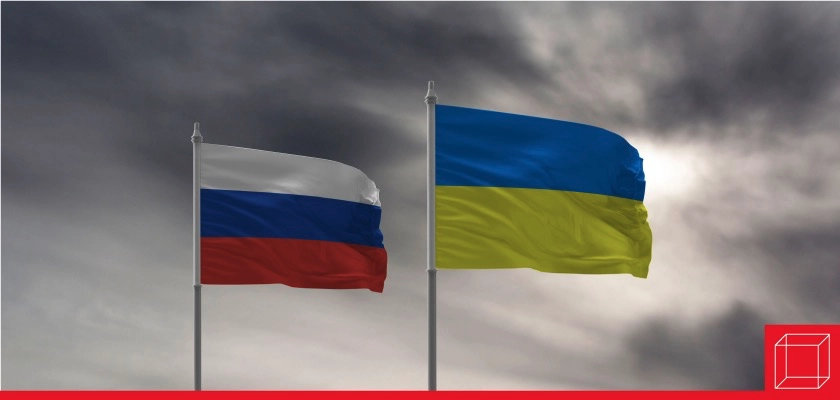War in Ukraine: Construction of National Identities, Manufacturing Consent, and the Power of Collective Memory
On February 24, 2022, the Russian army invaded Ukraine, starting a brutal war that sent shock waves around the world.

On February 24, 2022, the Russian army invaded Ukraine, starting a brutal war that sent shock waves around the world. Can social sciences provide us with some understanding of this war? Why do the majority of Russians support the war? Why are the Ukrainians willing to die for their country fighting the Russians? And, finally, why is the U.S. government involved in this conflict in a way that it is not involved in other conflicts fought in the Global South in places lake Yemen, Somalia, Myanmar, or Kongo?
Since wars are horrifying and very costly in both financial and human terms, political leaders embarking on the path of military conflict must convince society that war is the only option to avert real or imagined existential threats emanating from outside. The leaders, with the assistance of the mass media, must be able to “manufacture consent,” to use the term coined by Chomsky and Herman, to justify the country’s entrance into a war and to mobilize millions of the country’s citizens to support the war effort.
Social movement scholars argue that leaders use various framing processes that rely on shared cultural understanding in society to gain supporters.i For example, they argue that leaders use value amplification by framing issues in a way that appeals to the most important values in a society, to mobilize people to their cause. In both Russia and Ukraine, the value amplification means appeals to nationalism and patriotism.
This mobilization for war, according to cultural sociologists, is accomplished by using myths and symbols and the “mobilization of history” in the construction of national identities.ii This shared history often includes episodes of being oppressed, heroic battles, and immense suffering at the hands of some outside enemy. These heroic periods of national history, real or imagined, are invoked by leaders in times of national crisis. In both Russia and Ukraine, political leaders use the collective memory of the Second World War to heighten nationalist sentiments and to strengthen people’s willingness to fight in the current war.
In Russia, the consent for war has been manufactured by the state-controlled media, which has created an exaggerated narrative about the influence of fascist groups in Ukraine. According to this narrative, the goal of Russia’s military intervention is to “de-Nazify” that country.iii Given the history of Nazi atrocities in the Soviet Union during the Second World War, such a narrative resonates with the Russian people. In Russia, the numerous memorials to what Russians call the Great Patriotic War and the yearly celebration of Victory Day on May 9, when Berlin fell to the Soviet Army, are an ever-present reminder of war and symbols of Russian heroism and sacrifice. Indeed, on May 9, in his Victory Day speech, Putin reinforced the Russian government’s narrative about the reason Russia invaded Ukraine, citing the threat of Nazis in Ukraine.iv
Putin’s government also portrays the Russian invasion as a defense against an existential threat that NATO, a military alliance of Western countries with roots in the Cold War between the Soviet Union and the United States, poses to Russia. Some historians point to the continuous enlargement of NATO after the collapse of the Soviet Union as a reason for Russia’s military interventions outside its borders.v Presented as such, Russian leadership frames the war in Ukraine as the continuation of the historic struggle against the hostile West. Ironically, after years of post–Cold War thaw in hostilities between Russia and the West, Russia’s invasion of Ukraine resulted in a renewed arms race and hostile rhetoric reminiscent of the Cold War era. The U.S. government, together with other NATO countries, has framed
Russia as an existential threat to Europe and is sending billions of dollars in arms to Ukraine that are used to fight the Russian army. Without putting troops on the ground, the United States has indirectly taken a side in this war.
Ukrainian leaders as well as Ukrainian media have also framed the history of their country to manufacture consensus for the current war. Just like Putin, the President of Ukraine invokes memories of the country’s suffering and sacrifice under the Nazis during World War II. In a YouTube broadcast, Zelenski stated: “Russia attacked Ukraine in a cowardly and suicidal way like Nazi Germany did during World War II.”vi Zelenski, who is Jewish, also talked about his father Semyon, a World War Two veteran, in a Facebook post to mobilize support for the current war:
[Semyon] went through the whole war and remain[s] forever in my memory one of those heroes who defended Ukraine from the Nazis. . . . Thanks for the fact that the inhuman ideology of Nazism is forever a thing of the past. Thanks to those who fought against Nazism—and won.vii
Putin’s assertion that Ukraine is not a state with its own history but rather a part of Russia helped mobilize Ukrainians to resist the invading Russians.viii It is true that for centuries the territories comprising present-day Ukraine were part of the Russian Empire (Western Ukraine was part of Poland) and that Ukraine existed as an independent state briefly from 1918 to 1922 and after the collapse of the Soviet Union in 1991. However, it is the evocation of this long history of fighting for independence that resonates with most Ukrainians.
To conclude, war is a tragedy that results in tremendous suffering and destruction. However, rather than avoiding war, political leaders are framing arguments justifying war in a way that is effective at mobilizing their citizens for the war effort. They use ideologies that evoke a history of fighting against oppression, and they stoke the nationalist fervor to sustain that fight. The mass media becomes the conveyer belt that transmits governments’ ideologies to the masses to manufacture consent for the war in their own countries and abroad.
Discussion Questions:
1. What role does the mass media play when it comes to societal mobilization for war?
2. One of the core ideas of sociology is that reality is socially constructed, or that our background and biases determine how we see reality. How can you apply this sociological concept to explain the different narratives of the war in Ukraine?
3. Why is the U.S. government siding with Ukraine in this conflict? Does the U.S. mass media reporting on the war in Ukraine parallel the position of the U.S. government? If yes, why?
References
i Snow, David A., R. Burke Rochford, Jr., Steven K. Worden, and Robert D. Benford. (1986). “Frame Alignment Processes, Micromobilization, and Movement Participation.” American Sociological Review 51: 464–481.
ii McCrone David. (1998). The Sociology of Nationalism. London: Routledge
iii Brockell, Gillian. (2022, February 25). “Putin says he’ll ‘denazify’ Ukraine. Its Jewish president lost family in the Holocaust.” The Washington Post. https://www.msn.com/en-us/news/world/putin-says-he-ll-denazify-ukraine-its-jewish-president-lost-family-in-the-holocaust/ar-AAUjQqr Gillian Brockell - Feb 25
iv Lawlor, Katherine, and Mason Klark. (2022, May 9). PUTIN’S VICTORY DAY SPEECH FORGOES AN OPPORTUNITY TO ESCALATE RUSSIA’S INVASION OF UKRAINE. Institute for the Study of War. https://www.understandingwar.org/backgrounder/putin%E2%80%99s-victory-day-speech-forgoes-opportunity-escalate-russia%E2%80%99s-invasion-ukraine
v Chotiner, Isaac. (2022, March 1). “Why John Mearsheimer Blames the U.S. for the Crisis in Ukraine.” The New Yorker. https://www.newyorker.com/news/q-and-a/why-john-mearsheimer-blames-the-us-for-the-crisis-in-ukraine
vi Ukraine’s Zelensky says Russia acting like ‘Nazi Germany’ (2022, February 24). The Times of Israel. https://www.timesofisrael.com/liveblog_entry/ukraines-zelensky-says-russia-acting-like-nazi-germany/
vii Brockel, Gillian
viii Schwirtz, Michael, Varenikova, Maria, and Rick Gladstone. (2022, February 21). Putin Calls Ukrainian Statehood a Fiction. History Suggests Otherwise. The New York Times. https://www.nytimes.com/2022/02/21/world/europe/putin-ukraine.html Feb. 21, 2022



